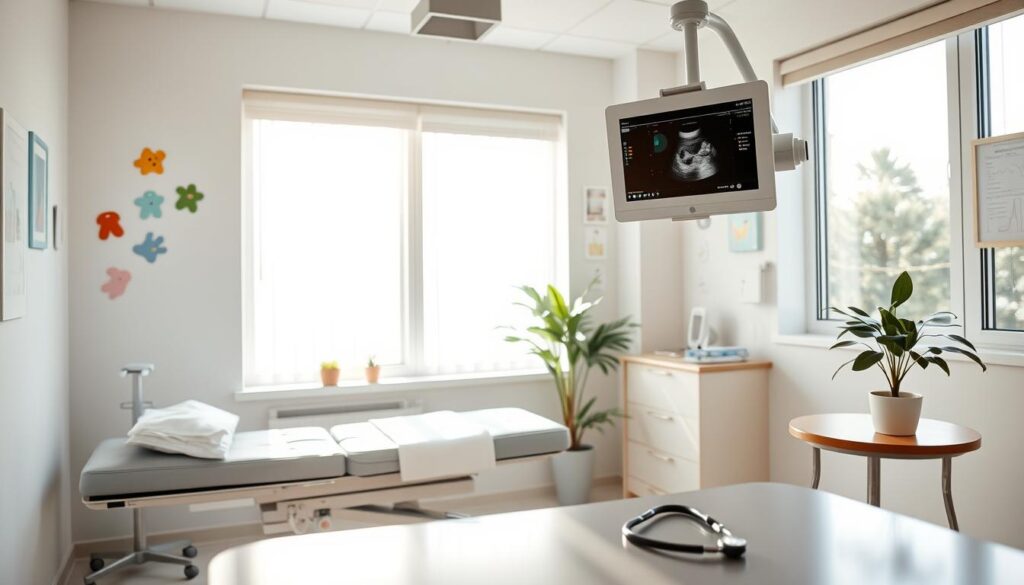Congratulations on your pregnancy! The first trimester is a time of excitement and change. Your body is preparing to support your baby’s growth. This guide will help you through the first three months with confidence.
Contents
- 1 Understanding the First Trimester
- 2 Key Pregnancy Symptoms
- 3 Essential Doctor Appointments
- 4 Nutrition and Diet Considerations
- 5 Lifestyle Changes for Expecting Mothers
- 6 Important Supplements and Medications
- 7 Building Your Support Network
- 8 Preparing for Baby’s Arrival
- 9 Resources for First-Time Moms
- 10 FAQ
- 10.1 What defines the first trimester of pregnancy?
- 10.2 Why is early prenatal care important?
- 10.3 What are some common first trimester symptoms?
- 10.4 When should I schedule my first prenatal visit?
- 10.5 What tests and screenings are recommended during the first trimester?
- 10.6 What foods should I include in my pregnancy diet?
- 10.7 What types of exercise are safe during the first trimester?
- 10.8 What are the key supplements I should take during pregnancy?
- 10.9 How can I build a strong support network during my pregnancy?
- 10.10 What should I include in my first trimester checklist?
Key Takeaways
- Understand the significance of the first trimester and the importance of early prenatal care
- Learn about common pregnancy symptoms and when to seek medical advice
- Discover essential doctor appointments, recommended tests, and screening procedures
- Explore nutrition and dietary guidelines to support a healthy pregnancy
- Discover lifestyle changes, including exercise and stress management, to optimize your well-being
- Familiarize yourself with important supplements and medications
- Build a strong support network and prepare for your baby’s arrival
Understanding the First Trimester
The first trimester is a key time, covering the first 12 weeks of pregnancy. It’s when expecting mothers start a journey that shapes a healthy pregnancy and a growing baby.
What Defines the First Trimester?
The first trimester starts with the first day of the last menstrual period. It ends at the 12th week of pregnancy. This time is crucial for the baby’s growth, from a tiny embryo to a fully formed fetus with a beating heart and growing organs.
Importance of Early Pregnancy Care
Early prenatal care is vital for the health of both mom and baby. In the first trimester, doctors watch over the mother’s health closely. They address any issues early on to ensure a smooth pregnancy. Regular check-ups, prenatal vitamins, and making healthy lifestyle choices help a lot.
“The first trimester is a crucial time for the baby’s development, and it’s important for expecting mothers to prioritize their health and well-being during this period.”

Understanding the first trimester and getting involved in prenatal care is key. It sets the stage for a healthy and fulfilling pregnancy. This foundation is essential for the exciting journey that lies ahead.
Key Pregnancy Symptoms
The first trimester of pregnancy is both exciting and overwhelming. Your body goes through amazing changes. Knowing the common early pregnancy symptoms can help you take care of yourself during this time.
Common Symptoms to Expect
The first trimester brings a range of symptoms. These can vary from one woman to another. Some common symptoms include:
- Fatigue – Feeling very tired and needing more rest is a sign of early pregnancy. Your body is working hard to support the growing baby.
- Nausea and vomiting – Known as “morning sickness,” it can happen at any time. It’s one of the earliest and most known symptoms.
- Breast tenderness and changes – Your breasts may become more sensitive, swollen, or change in size. This is as your body prepares for breastfeeding.
- Increased urination – You may need to urinate more often. This is because your body is increasing blood flow and your uterus is expanding.
When to Seek Medical Advice
While many symptoms are normal, some may need medical attention. If you have severe or persistent nausea and vomiting, extreme fatigue, or any concerning symptoms, seek medical advice. Your doctor can offer guidance and help you navigate the early stages of pregnancy.

Remember, every pregnancy is unique. Your experience may differ from others. By staying informed and talking openly with your healthcare team, you can manage symptoms and prepare for the journey ahead.
Essential Doctor Appointments
The first trimester of pregnancy is both exciting and overwhelming. Scheduling your first prenatal visit is key. It’s where you get the tests and screenings you need. These visits help track your health and give insights into your baby’s growth.
Scheduling Your First Prenatal Visit
Book your first prenatal appointment as soon as you know you’re pregnant. This visit is important for building a relationship with your doctor. You’ll discuss your health history, lifestyle, and any worries you have.
Your doctor will do a physical check-up, order blood tests, and guide you on prenatal care. They’ll also talk about the changes you’ll see in the coming months.
Recommended Tests and Screenings
In your first trimester, your doctor will suggest various tests and screenings. These are to check your health and your baby’s well-being. You might have:
- Prenatal care to watch your health and track your baby’s growth
- Ultrasound appointments to see your baby’s development and spot any issues
- Genetic testing to look for chromosomal problems or inherited disorders
These tests and screenings are crucial. They help find any problems early on. This way, your healthcare team can offer the right care and support.

“Prenatal care is crucial for ensuring the health and well-being of both the mother and the developing baby. Regular check-ups and screenings help detect any issues early on and provide the necessary guidance and support.”
Nutrition and Diet Considerations
Keeping your diet balanced and nutritious is key in the first trimester. This is when your baby’s organs and body systems grow fast. It’s important to give the right nutrients to support this growth.
Foods to Include in Your Diet
A good pregnancy diet should have lots of nutrient-rich foods. These include:
- Leafy green vegetables (spinach, kale, collard greens)
- Citrus fruits (oranges, grapefruit, lemons)
- Whole grains (brown rice, quinoa, whole wheat bread)
- Lean proteins (chicken, fish, eggs, legumes)
- Healthy fats (avocado, nuts, olive oil)
Foods to Avoid During Pregnancy
It’s also important to know which foods to limit or avoid. These include:
- Raw or undercooked meats, seafood, and eggs
- Unpasteurized dairy products
- Alcohol and caffeinated beverages
- High-mercury fish (shark, swordfish, king mackerel)
- Deli meats and soft cheeses (unless they’re pasteurized)
Along with a healthy diet, taking prenatal vitamins is also advised. They help make sure you get enough nutrients, like folic acid, for a healthy pregnancy.

“A healthy, balanced diet during pregnancy is one of the best things you can do for your growing baby.”
Lifestyle Changes for Expecting Mothers
Pregnancy brings big changes in your body and mind. It’s key to focus on your health during this time. This means staying active and managing stress well.
Importance of Exercise in Early Pregnancy
Exercise is great for pregnant women. It boosts your mood and energy. It also gets your body ready for labor and delivery.
It can also lower the risk of health problems like diabetes and preeclampsia.
Safe exercises for the first trimester include:
- Walking
- Swimming
- Prenatal yoga
- Low-impact aerobics
Tips for Reducing Stress
Pregnancy can be stressful. There are many changes and new things to think about. It’s important to find ways to relax and take care of your mind.
- Practice mindfulness and meditation
- Engage in relaxing activities like reading or listening to music
- Attend prenatal classes to connect with other expecting mothers and learn coping techniques
- Seek support from your partner, family, and friends
Looking after your body and mind in the first trimester is crucial. It helps you have a healthy pregnancy and a smooth start to motherhood.
Important Supplements and Medications
Exploring prenatal vitamins and supplements can feel overwhelming, especially in the first trimester. These nutrients are key for your baby’s growth and your health. Let’s look at why prenatal vitamins and other supplements are vital for a healthy pregnancy.
Prenatal Vitamins Explained
Prenatal vitamins give you the vitamins and minerals you need during pregnancy. They include folic acid, iron, calcium, and more. These nutrients nourish you and your baby. Experts say to start taking prenatal vitamins before you get pregnant to get ready.
Other Recommended Supplements
While prenatal vitamins are the base, you might also need other supplements in the first trimester. These could be:
- Omega-3 fatty acids for brain and eye health
- Vitamin D for strong bones and immune health
- Probiotics for a healthy gut and digestion
Always talk to your healthcare provider before adding new supplements. They can guide you based on your needs and health history.
“Taking the right supplements during the first trimester can make a significant difference in your pregnancy journey.”
Adding prenatal vitamins and supplements to your daily routine is key in the first trimester. By focusing on your nutrition and medication, you’re taking a big step towards a healthy pregnancy.
Building Your Support Network
Pregnancy is both exciting and challenging. Having a strong support network is key during this time. By involving your partner and connecting with family and friends, you can face the first trimester and beyond with confidence and comfort.
Involving Your Partner
Your partner’s role in your prenatal care is great for you and strengthens your bond. Encourage them to go to doctor appointments, talk about concerns, and help make decisions. This shared journey can make your relationship stronger and prepare you for your baby’s arrival.
Connecting with Family and Friends
Turning to your loved ones in the first trimester offers emotional support. Share your joy and any hurdles with family and friends who can listen, offer advice, and support you. Joining a prenatal support group, online or local, can also connect you with others going through similar experiences.
“Having a strong support system during pregnancy can make all the difference in the world. Don’t be afraid to ask for help and lean on your loved ones.”
Creating a support network benefits you in the first trimester and beyond. Surrounded by caring people, you can focus on your prenatal care and the exciting changes ahead.
Preparing for Baby’s Arrival
As the first trimester ends, expectant parents can start getting ready for their baby’s arrival. This important time is for making a birth plan and picking out nursery items.
Creating a Birth Plan
Making a detailed birth plan helps you and your healthcare provider meet your wishes during delivery. Prenatal classes offer great advice on what to include. They cover everything from pain relief to postpartum care. A well-thought-out plan gives you control and confidence during this big change.
Items to Consider for the Nursery
Start thinking about the nursery as you look forward to your baby’s arrival. The first trimester checklist might not need a lot of nursery prep. But, it’s good to start thinking about the basics:
- Crib and mattress
- Changing table or dresser
- Comfortable rocking chair or glider
- Ample storage for clothes, diapers, and other supplies
- Soothing decor and lighting to create a calming environment
Don’t worry if the nursery isn’t done by the first trimester. Just planning and gathering these key items can help make the transition to parenthood easier.
“The first nine months of my life were spent preparing for the rest of my life.” – Susie Bright
Resources for First-Time Moms
Starting your first pregnancy is exciting. There are many resources to help you. You can find books, apps, and online communities. They offer lots of information and support during this special time.
Recommended Books and Apps
For first-time moms, some key books are “What to Expect When You’re Expecting” by Heidi Murkoff, “The Girlfriends’ Guide to Pregnancy” by Vicki Iovine, and “Mayo Clinic Guide to a Healthy Pregnancy” by the Mayo Clinic. Apps like Ovia Pregnancy, The Bump, and Baby Center are also great. They give tips, trackers, and lots of pregnancy info.
Online Communities and Forums
Connecting with other moms-to-be is very helpful. Join places like BabyCenter Community, Reddit’s r/BabyBumps, or Facebook groups like Pregnancy & Postpartum Support. These groups let you share, ask questions, and find support from others. They’re great places to talk about pregnancy together.
FAQ
What defines the first trimester of pregnancy?
The first trimester is the first 12 weeks of pregnancy. It starts from when you conceive and ends at the end of the third month.
Why is early prenatal care important?
Early prenatal care is key for a healthy pregnancy. It lets your doctor check on you and your baby. They can also address any concerns and make sure your baby is growing right.
What are some common first trimester symptoms?
You might feel tired, nauseous, and have sore breasts in the first trimester. You might also pee more and feel mood swings. If these symptoms are bad or last too long, talk to your doctor.
When should I schedule my first prenatal visit?
See your doctor as soon as you think you might be pregnant. Try to do this between 8-12 weeks. Your first visit will include a check-up, talking about your health history, and discussing your pregnancy.
What tests and screenings are recommended during the first trimester?
You’ll have blood work, a urine test, and an ultrasound in the first trimester. You might also get genetic tests like the Noninvasive Prenatal Test (NIPT). These tests check on you and your baby’s health and look for any risks.
What foods should I include in my pregnancy diet?
Eat lots of fruits, veggies, whole grains, lean proteins, and healthy fats. Don’t forget to take a prenatal vitamin. It helps make sure you and your baby get all the nutrients you need.
What types of exercise are safe during the first trimester?
Walking, swimming, and prenatal yoga are good choices for the first trimester. Always check with your doctor before starting any new exercise.
What are the key supplements I should take during pregnancy?
A good prenatal vitamin is essential. It should have folic acid, iron, calcium, and other important vitamins and minerals. Your doctor might also suggest other supplements based on your needs.
How can I build a strong support network during my pregnancy?
Having your partner, family, and friends involved is great. You can also join a pregnancy support group. It’s a good way to meet other expectant moms.
What should I include in my first trimester checklist?
Your checklist should have your first prenatal visit, taking prenatal vitamins, and managing symptoms. Also, eat well, exercise gently, and start planning for your baby’s arrival.

